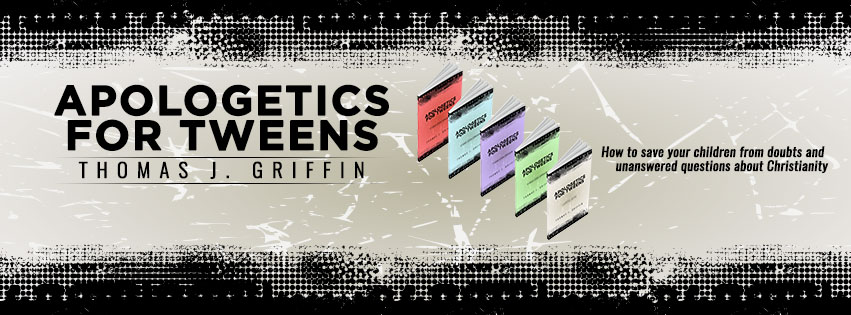By Tom Griffin. My main focus in apologetics over the last 20 years has been for our youth. When I began, it was over concerns for Christian youth and nonbelievers entering the primarily secular, liberal world of college. The statistic that drove concern was from decades of research by LifeWay and Barna that 70% of Christian youth dropped out of the church by age 22. The reasons were primarily due to intellectual doubt, unanswered questions and a belief that the Bible was not relevant in their lives. Apologetics is a solution to address this problem. Ratio Christi, www.ratiochristi.org is an international apologetics organization with 200 apologetics clubs on campuses worldwide. I have been associated with them in various roles since 2011. It has been a great blessing for me and for those on the campuses we serve: students and professors who are believers and nonbelievers. Wonderful testimonies are recorded for how God is moving in this arena.
After about five years of working with students on college campuses, we discovered that college was often too late to address doubt and concerns. It turns out that they are formed at a much earlier age. 84% of Christian youth have doubts by the time they graduate from high school. That means we have to teach them at a much younger age than previously contemplated. My own experience teaching 5th graders primarily, but also middle school, proves this out. We have to catch them before doubt creeps in. By fifth grade, the questions are there. If unanswered, the questions can become doubt. Doubts become skepticism and then faith is shaken when secular answers from intellectual professors and friends are discovered for their questions.
That brings me to today’s topic: Gen Z. Gen Z is typically defined as those born in 1999 to 2005; primarily this means 18 and younger. In a recent Barna study in cooperation with Impact360, www.impact360institute.org , another Christian apologetics organization, the following five alarming statistics arose for this age group:
- Gen Z identify as atheist at double the rate of the general population. This means about 13% of them. Who is teaching or not teaching them that there is no God? I’m sure the church is not teaching them this so their information comes from the internet and social media, friends and some parents. Is it not proof that we need to teach them that God exists? There is substantial evidence that points to this, including:
- The creation of the universe requires a transcendent, all-powerful Cause
- The creation of first life requires an intelligent Source to account for DNA
- The amazing fine-tuning of the universe specifically to support life on earth is acknowledged even by many scientists as a good argument for theism. These are not ‘God of the gaps’ answers but rather the evidence itself points to a creator God.
- Only 4% of Gen Z have a biblical worldview. What is the church teaching if not a biblical worldview? Well, I believe the church is not teaching about worldviews at all in fact. The kids know all the details of all the Bible stories by heart. But how many can explain how we know the Bible can be trusted and is reliable? Very few. If our kids do not know the primary worldview alternatives and why Christianity is the best explanation for reality, how will they deal with it when faced with one of the alternative worldviews that may sound appealing? The answer is we MUST teach them about worldviews and how we know Christianity is true, the Bible is reliable, and Jesus is God.
- 51% of Gen Z believe happiness is the ultimate goal in life. This is a recipe for depression and explains why so many of our youth experience such. Happiness is fleeting; it is momentary and will not last. If this is the goal for life, it is one that will be elusive and cause great pain because we will all suffer just as Jesus did. There is only hope in Him. A life filled with intermittent depression because a goal cannot be achieved and maintained is a self-fulling end that leads away from happiness.
- Only 34% of Gen Z believe lying is morally wrong. This is a denial of truth as an important virtue or even as a virtue at all. It is not surprising though as other studies have shown that 70% of 16-25 year olds do not believe in absolute truth. If truth is merely opinion, then anything goes and lying is of no significance. But truth is actually undeniable. You cannot claim “there is no truth” without making a truth claim. When it comes to morality, if there is no ground for absolute morality then, again, anything goes. Without God there is no such ground. Only with God as the moral standard of goodness can we recognize evil and immorality.
- Only 25% of Gen Z believe science and the Bible are complementary. So 75% believe that the Bible and science conflict or contradict apparently. Do they conflict? No, not if God exists. Nature is God’s expression of truth in the physical world. The Bible is God’s expression of truth through His word. They do not and cannot contradict. Where there is an apparent contradiction, either science is wrong or our interpretation of scripture is wrong or some of both. All the controversy over the age of the earth, evolution, the flood and miracles is due to one or both of those issues just mentioned. In fact, the more we learn about science the more it provides evidence that point to the truth of Christianity. We have in today’s age more evidence for Christianity than at any point in the history of our world since the resurrection. It was only about 25 years ago that science confirmed the universe had a beginning. That has been a huge problem for atheists and evolutionists ever since because it proves the cause of the universe is transcendent and a beginning cuts short the trillions of years needed for evolution to theoretically and mathematically be feasible.
How many of our Christian youth know these strong pieces of evidence for Christianity? How many of our churches teach these principles? If our youth are not taught this critical information by the church, who will teach it to them?
My best answer to this critical question is homeschool teachers. You are the last line of defense against the secular world. It is up to you to take a major role and save our youth. I am sorry to put this burden on your shoulders but there is no denying you are in the best position to do so. How can you accomplish this task? Where will you get the tools and knowledge? I submit that my 5th, 6th, 7th, and 8th grade curriculum, Apologetics for Tweens, is a great place to start. The knowledge, materials, format and implementation tactics are all there for you. And it is packaged affordably at about $75 per year or a little over $200 for the complete set. Contact me for any questions at tjgconsult@aol.com . The time to start is now because more of our Christian youth are choosing the wrong path every day.

 Recently an attendee I met at a conference ordered the complete set of curriculum for Apologetics for Tweens. He has worked diligently at a local university to provide apologetics training and discussion for college students for nearly a decade. At the same time, he has been persistently reaching out in his own church to develop some apologetics programs for the youth.
Recently an attendee I met at a conference ordered the complete set of curriculum for Apologetics for Tweens. He has worked diligently at a local university to provide apologetics training and discussion for college students for nearly a decade. At the same time, he has been persistently reaching out in his own church to develop some apologetics programs for the youth. Last weekend I traveled to Murfreesboro, TN to attend a one day apologetics conference sponsored by NRBTV called “Defending Truth”. It featured notable Christian apologists Ravi Zacharias, Frank Turek and J. Warner Wallace. There were about 1100 attendees who waited patiently in a two block line to pass police security scanning on a drizzly Saturday morning.
Last weekend I traveled to Murfreesboro, TN to attend a one day apologetics conference sponsored by NRBTV called “Defending Truth”. It featured notable Christian apologists Ravi Zacharias, Frank Turek and J. Warner Wallace. There were about 1100 attendees who waited patiently in a two block line to pass police security scanning on a drizzly Saturday morning. Last week I attended the National Conference for Christian Apologetics. Our organization, Ratio Christi, had a prominent table for interactions with attendees and partners.
Last week I attended the National Conference for Christian Apologetics. Our organization, Ratio Christi, had a prominent table for interactions with attendees and partners.

